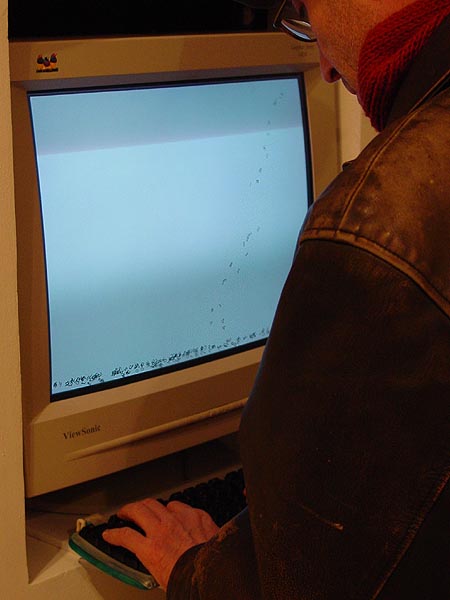View current page
...more recent posts

I think it was degenerate gambler Bill Bennett that came up with the idea that conservative types should flash the "purple finger" on the eve of the latest "no really this is the turning point" electoral whatever in Iraq. I redid the picture in Photoshop, and it may seem cynical, but it's not one-tenth as cynical as the racially prejudiced Republicans pretending they give a shit what happens to people in that part of the world. We've spent close to a half trillion dollars that could have gone to help Katrina victims, fund decent health care, improve public schools... All for an "experiment in democracy" that Bush gave us as the reason we invaded Iraq only after weapons of mass destruction failed to turn up. It's about controlling the Middle East, you chumps.

Another great gift item from the best named band in the world, Neg-Fi. On sale this weekend at La Superette, the annual sale of useful items and artistic geegaws organized by Tali Hinkis and Susan Agliata. This year the sale's at Exit Art, Saturday and Sunday, Dec. 17 and 18. More details and pics to follow. The piece above is described as follows:
Neg-Box
$30
Neg-Fi
negfi@excite.com
"Bad connection" sound generator. Turns any sound into static and hiss!
Thanks to Artkrush for including this blog in their current profile on the art blogosphere. I'm told the magazine is being sent to its email subscribers December 14. Introductory paragraph:
The rapid rise of the blog phenomenon has dramatically influenced politics over the past few years, and now blogs are changing how the art world communicates. Interactive sites, which are devoted to contemporary art and offer news, reviews, gossip, and links, have made art openings as easy to follow as the stock market. The freedom of the blog format also allows "citizen critics" to weave social commentary and personal anecdotes with spontaneous photographs, videos, and relevant links."Citizen critics" is good. The first sentence reminds me a bit of something posted here a few years ago, except I said gloomily that I'd "watched in amazement as blogging has transformed the political world (e.g., the demise of Trent Lott), while at the same time having nil effect on the art world." Even as recently as 8 months ago, this page was complaining that art worlders don't google to see what's written about them online, or at least they pretend not to. See "Report from the Slo-o-o-o--o-ow Dimension." Of course one shouldn't pick nits on the occasion of getting some magazine coverage, but I think saying cyberspace is changing the gallery art world is still optimistic. New media art, that's another story, that's the water they swim in.
OK, kidding aside, the sale of delicio.us to Yahoo and the sale of Myspace to Rupert Murdoch both really suck. Selling delicio.us (a system for pooling intriguing links that fosters communities and subcommunities of interest) seems especially painful since that's a very tech-savvy, web-savvy group--focused in their lack of focus, or multiple foci. I know next to nothing about Joshua Schachter, the founder, but is it right that he should personally profit from the sweat and passion of hundreds of folks who thought they were part of a community, as opposed to being part of some venture capitalist's or cool hunter's wet dream? I trust he will be sending checks to all the geeks who put him in clover--yeah, right. Yes, I know bandwidth and storage cost money and no one should be forced to be a benefactor, but seriously--that's a group effort. Maybe Schachter's going to give all the money to Katrina victims. If there's any altruism involved with the sale, please let me know.
With the recent news of Rupert Murdoch's purchase of Myspace and Yahoo's acquisition of del.icio.us (no kidding) still wafting noisomely through the air, I feel I should come clean about some recent corporate machinations regarding my own site. A friend on the "inside" recently sent me an interesting email:
Yes, we're looking at Moody's blog, too, but the numbers aren't up there where I'd like. The guy keeps changing the subject, and thwarts every reasonable attempt at branding, or self-branding. One day he's an artist, the next he's posting his damn plinky techno "compositions." He'll create a perfectly good, catchy animation and then put up some stupid thing from a kid's web page. Then he rails about politics and the system. God knows we'd like to shut him up by buying him, the way we're going to put a cork in those little bastards at Myspace and del.icio.us, but it has to make economic sense. This Moody weirdo just doesn't command a big enough slice of the wild and crazy youth demographic. So fuck him.Sorry for all the bad language, but that's how they talk in big media and advertising corporations! It's nice to know they're thinking about me, I guess. (OK, except for the part about Murdoch and Yahoo, this is all BS. It's how I process disappointing news.)


An interactive computer piece by Marcin Ramocki, still in development, currently on view at artMovingProjects in Brooklyn. A gallery visitor is typing a straight line of text across the top of the screen. As he types the letters fall slowly to the bottom, just like snow, fall leaves, or advancing Space Invaders. When he reaches the right hand side, a carriage return sound cha-chings and he can type no more till all letters have settled to the bottom. After many more left-to-right sweeps the letters pile up, but even after days of straight typing, the pile will never fill more than half the screen because the alphabet "soil" is slowly decaying--again, like leaves on a forest floor. Much hand coding lies behind this deceptively low-tech-looking piece, which melds the naturalism of Thoreau and the futility of Beckett in a medium somewhere between concrete poetry and Intellivision.




Tomorrow, December 11, is the opening of
Sometime in the '80s it became the mantra that capitalism wasn't the evil thing hippies said it was, that it was the best bad system we had, and so on. I never really bought the program, though. While to some extent it mediates supply and demand, greed and altruism, too much of it is still predicated on waste, and a bogus sense of competition.
Take science fiction books, just as an example. (Or CDs, clothes, art sold in galleries...) Every year there is a crop of "new, hot" titles. Publicists tout the authors as geniuses, young turks who rock our world like it's never been rocked. Yet a book has one shot at prime rack space. If it doesn't sell, it's yanked and becomes landfill, and the hot author joins the thousands of has-beens who had their moment and failed. But what if the book had a crappy cover? What if an idea that didn't resonate this year rang like a gong the next? Too bad, the system must have winners and losers.
Two authors I'm interested in, Doris Piserchia and A. A. Attanasio, both had multi-book contracts with major houses. Piserchia never really rose above the B list of genre writers, her quirky brilliance notwithstanding, but Attanasio was hailed by the LA Times in the '80s as a "towering talent" and he got the full panoply of hype for his ambitious first book, Radix. (Which I am re-reading with rubber-jawed amazement. What a writer, what language, what a sustained high pitch of inventiveness.)
Try finding either on bookstore shelves now. They've been "dropped," the way artists get dropped from galleries and musicians from labels. The shelves are full of newer, presumably more towering talents, and to find the parapets of a few years ago you have to wade into, if not actual landfills, the moldy scrap heap of used booksellers.
You could say, "Ah, that's the way of the world," or as a Republican would say, "Life's tough." I say our way of doing things is suspect. The internet is the first thing that's given me hope that eventually all these novelty-obsessed distributors and gatekeepers will themselves soon be out of jobs, and that independent systems will emerge (such as small, print-on-demand publishers) that allow all titles to be continuously "in print" and all good authors to be found, vetted, and nurtured by their true audiences.
